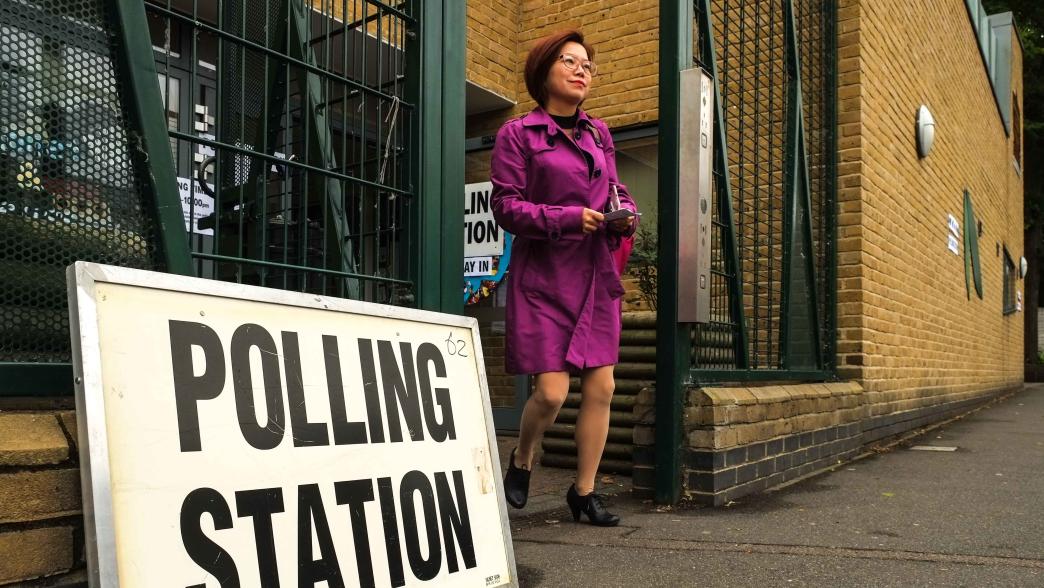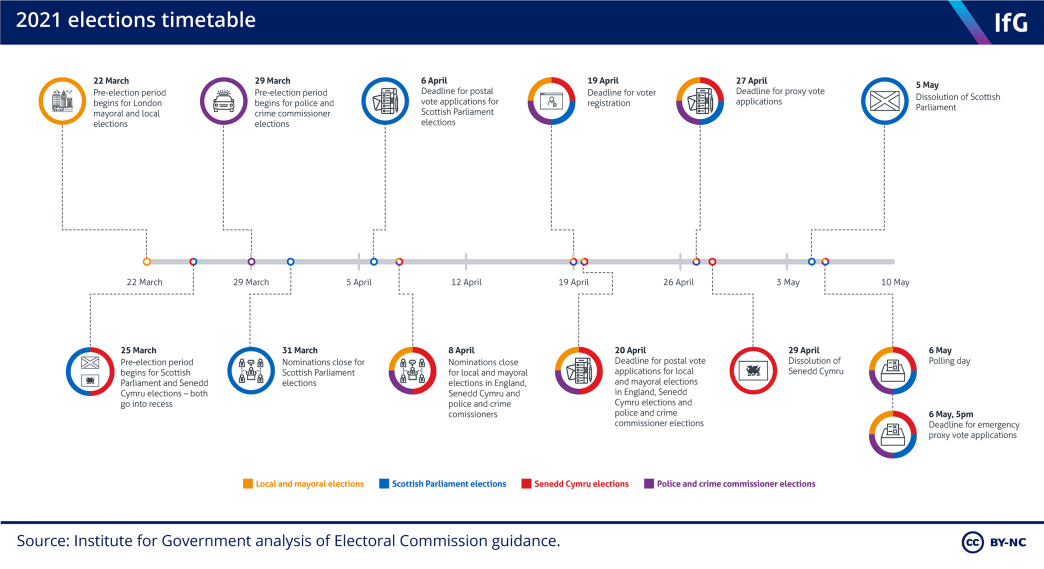Voting in the 2021 elections
On 6 May 2021, voters across Great Britain will go to the polls for devolved and local elections.

In early 2021, the UK, Scottish and Welsh governments were all considering whether to delay the elections as a coronavirus precaution. However, as the pandemic receded, the governments confirmed that the elections would go ahead, with appropriate social distancing and hygiene requirements in all polling stations.
On 6 May 2021, voters across Great Britain will go to the polls for devolved and local elections. These include elections for the Scottish Parliament, Senedd Cymru (Welsh Parliament), the Mayor of London and London Assembly, metro mayors and local authorities in England, police and crime commissioners in England and Wales, and one UK parliament by-election in Hartlepool.
When do the election campaigns begin?
The official election campaigns begin at the start of the pre-election period – commonly known as ‘purdah’. During this period, governments face restrictions on what decisions they can take and what announcements they can make, to prevent them from using official government resources to influence election results. The pre-election periods began on 22 March for the London elections, on 25 March for the Scottish Parliament and Welsh Senedd elections, and on 29 March for local council and police and crime commissioners elections.
Normally, the Scottish and Welsh parliaments are dissolved at the start of the election period – so members of these legislatures stop representing their constituencies and all seats are vacant pending the results of the election. This year, however, the Scottish Parliament and Senedd Cymru went into recess at the start of the pre-election period, but will not be formally dissolved until 5 May and 29 April respectively. This is so that they can be recalled to respond to unexpected developments relating to the coronavirus pandemic.
Who can vote in the 2021 elections?
There are different rules for who can vote in the different sets of elections on 6 May 2021.
The franchise for Scottish and Welsh parliament elections is a devolved matter, so the legislatures in Edinburgh and Cardiff can decide who votes in those elections. The UK government sets the franchise for all elections in England, as well as for the police and crime commissioner elections in both England and Wales.
|
|
Local and mayoral elections in England |
Scottish Parliament election |
Senedd Cymru election |
Police and crime commissioner elections (in England and Wales) |
|---|---|---|---|---|
|
Who sets the franchise? |
The UK parliament |
The Scottish Parliament, subject to a two-thirds majority |
Senedd Cymru, subject to a two-thirds majority |
The UK parliament |
|
What is the voting age? * |
18 |
16 |
16 |
18 |
|
Which countries’ citizens can vote? |
British, Irish, qualifying** Commonwealth or EU national |
British, Irish, any qualifying foreign national |
British, Irish, any qualifying foreign national |
British, Irish, qualifying Commonwealth or EU national |
|
Can prisoners vote? |
No |
Yes, if serving sentences under 12 months |
No |
No |
*As measured on polling day
**A foreign national who is legally resident in the part of the UK where they wish to vote and has (or does not require) leave to remain.
When do voters need to register by?
The deadline for voter registration for all elections is 19 April.
The deadline to register for a postal vote is 20 April in England and Wales, but in Scotland the deadline has been brought forward to 6 April to allow time to process the anticipated increased volume of applications due to coronavirus.
Voters wanting a non-emergency proxy vote must request this by 27 April. However, those in need of an emergency proxy vote – including those who test positive for Covid-19 or are having to self-isolate – will be able to apply until 5pm on polling day.

Local and mayoral elections in England[1]
Scottish Parliament election[2]
Senedd Cymru[3]
Police and Crime Commissioner elections[4]
Election period begins
22 March for London elections 29 March for other mayoral and local elections[5]
25 March
25 March
29 March
Nominations close
8 April
31 March
8 April
8 April
Deadline for voter registration
19 April
19 April
19 April
19 April
Deadline for postal vote applications
20 April
6 April
20 April
20 April
Deadline for proxy vote applications
27 April
27 April
27 April
27 April
Deadline for emergency proxy vote application
5pm 6 May
5pm 6 May
5pm 6 May
5pm 6 May
Dissolution of Parliament
n/a
5 May
29 April
n/a
Polling day
6 May
6 May
6 May
6 May
-->
How does the voting process work for each election?
There are three types of electoral system used in the May 2021 elections, which means voters will cast their ballots in different ways in the different polls.
Elections to English local councils and the UK parliamentary by-election in Hartlepool use the first-past-the-post system (FPTP). Voters cast one vote per available seat and the candidate (or several candidates, in the case of multi-member local council wards) with the most votes wins.
English mayoral elections – including for the mayor of London, metro mayors and local authority mayors – and police and crime commissioner elections use the supplementary vote system. Voters rank their two favoured candidates on the ballot paper as a ‘first’ and a ‘second’ choice. If a candidate wins 50% of the first preference votes, they win outright. If not, all but the top two candidates are eliminated, and the second preference votes of eliminated candidates are reallocated. The candidate with the highest total resulting from both counts is elected.
The government recently confirmed that it intends to change the electoral system for these elections to first-past-the-post, but this reform will not come into effect in time for the 2021 election.
For elections to the Scottish Parliament, Senedd Cymru and the London Assembly the additional member system is used. Each voter has two votes.
The first vote is cast for a single constituency representative, and the candidate with the most votes is elected as in first-past-the-post.
The second vote is cast for a party (or occasionally an independent) at the regional (in Scotland and Wales) or London-wide level. A special formula (known as the d’Hondt formula) is then used to calculate the number of ‘additional’ members each party is entitled to. The formula takes into account the share of the vote and and number of constituency representatives each party has won, to ensure a proportional result overall. Specific members are elected in order of their appearance on the ‘party list’ drawn up in advance of the election.
When will we know the results of the elections?
Unlike normal elections, where most votes are counted overnight, the results of the May 2021 elections may not be known for a couple of days. Local returning officers are responsible for determining the practical arrangements for counting and verifying votes in their local area or constituency and announcing the result. So, as usual, results will come in at different times. However, the counting of votes is likely to be delayed and take longer, due to the need to ensure that staff can maintain social distancing and candidates can scrutinise activities safely.
Scottish government minister, Graeme Dey, told the Scottish Parliament that not all counts would take place simultaneously, and that most would take place over the Friday and Saturday following polling day.[6] Similarly, the Welsh Electoral Coordination Board has said that the 2021 count will take longer and require more staff. For this reason, it said, it would not be practical for counts to take place overnight, and instead staff will be asked to work extended hours the next day.[7] The UK government has also said counts for local elections “may take more time than for previous polls”.[8]
- Electoral Commission, Timetable for local elections in England: 6 May 2021, www.electoralcommission.org.uk/sites/default/files/2020-11/Election-timetable-LGE%20election.doc
- Electoral Commission, Guidance and resources for candidates and their agents at the Scottish Parliamentary election, www.electoralcommission.org.uk/i-am-a/candidate-or-agent/scottish-parliamentary-elections
- Electoral Commission, Guidance and resources for candidates and their agents at Senedd elections, www.electoralcommission.org.uk/i-am-a/candidate-or-agent/senedd-elections
- Electoral Commission, Guidance and resources for candidates and their agents at the Police and Crime Commissioner election, www.electoralcommission.org.uk/i-am-a/candidate-or-agent/police-and-crime-commissioner-elections
- Local Government Association, A short guide to publicity during the pre-election period, 26 January 2021, www.local.gov.uk/short-guide-publicity-during-pre-election-period#2021-local-and-london-elections
- Scottish Parliament, Scottish Parliamentary Elections 2021, www.parliament.scot/parliamentarybusiness/report.aspx?r=13163&i=119195
- BBC News, Covid: 2021 Senedd election will not be counted overnight, 5 January 2021, www.bbc.co.uk/news/uk-wales-politics-55547286
- Cabinet Office, 'Delivery of polls' in May 2021 Polls Delivery Plan, 5 February 2021, www.gov.uk/government/publications/may-2021-polls-delivery-plan/may-2021-polls-delivery-plan#delivery-of-polls
Visit our Elections 2021 hub for all of our analysis, commentary and events on the devolved and local elections.
- Topic
- Devolution
- Keywords
- Local elections
- Publisher
- Institute for Government